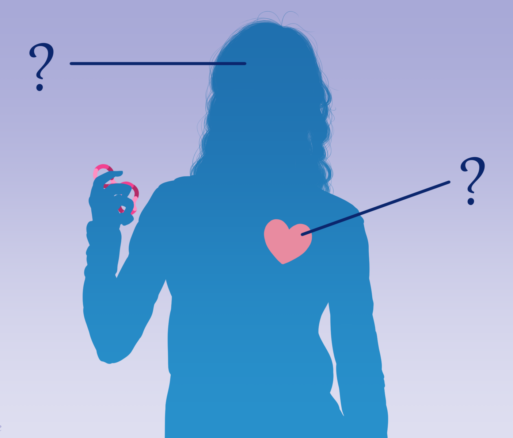
Alexithymia creates a disconnect between the mind and emotions.
Credit: MissLunaRose12 via wikimedia.org
We expect someone who loses a loved one to be overcome with grief and express that sorrow through tears, words and body language that convey deep sadness. So it’s vexing to people when someone appears to feel nothing. The cause may be alexithymia.
Alexithymia literally means “without words for emotions.” Clinicians began using this term in the 1980s for people who had the inability to experience or at least describe emotions.
“Alexithymia is essentially poor emotional insight,” said Dr. Dawn Neumann, associate professor at Indiana University School of Medicine, in a video from the national multi-media organization BrainLine. “Typical characteristics of alexithymia are lack of emotional self-awareness, so difficulty recognizing when you have an emotional response. It also encompasses challenges with being able to label or describe your feelings.”
Rather than speaking about feelings,people with alexithymia talk about the logic of why they acted in certain ways, often providing endless descriptions of situational details or symptoms rather than feelings.
Emotional Blindness
Because they have difficulty identifying and describing emotions, people with alexithymia — also known as “emotional blindness” — struggle to discern if they’re grieving, depressed or sad, or even feel sadness.
“I have empathy for both myself and those around me,” author Joselin Linder wrote in The New York Times about her struggle with alexithymia. “But sadness as a whole doesn’t exist in my emotional repertoire. Even weirder, I don’t think it ever has.”
She also noted that as is typical of those experiencing alexithymia, sadness was replaced with anger. “After my mother’s funeral I became so explosively angry at the funeral director over the obituary he posted that I left him expletive-filled voicemail messages until I was hoarse.”

Credit: Teona Swift
Dr Neumann explained that whether a person with alexithymia is aware of their emotions or not, “it’s still gonna affect your behavior… . You’re gonna react in certain ways but you’re not gonna have the capacity to control how you’re reacting because you’re lacking awareness for what those emotions are.”
Among several comments on YouTube responding to Dr. Neumann’s explanation, a young woman wrote, “So for me, I feel emotions, like love, excitement, happiness, jealousy. But I don’t cry when someone dies. Like today, I had my great-grandma’s funeral, and I was pretty close to her, but I did not shed one tear. It kinda makes me feel bad in a way.”
Another wrote, “I genuinely do not feel anything when someone dies. I do not understand what grief is and what it would feel like.”
Causes and Treatment
So what causes alexithymia? Clinicians currently believe it’s produced by a combination of genetic, neurological and environmental factors. A person may be born with a genetic abnormality that makes it difficult to feel and express emotions. It can also be caused by brain damage, which can be the result of an injury later in life. It’s often associated with Autism Spectrum Disorder, or ASD, though it’s not believed to be caused by it.
While most people have probably never heard of alexithymia, they’ve likely run across someone who’s experiencing it. It’s estimated that 13 percent of the U.S. population suffers from alexithymia. The prevalence among men is significantly greater (17%) than women (10%). Those figures are compatible with findings in European countries.
So how can people experiencing alexithymia find relief? Therapies such as cognitive-behavioral therapy and psychodynamic therapy are often used to help them explore and understand their emotions. Therapists may use techniques such as emotion-focused therapy to help clients identify and express their feelings more effectively, such as in a program underway at Indiana University
“It’s still early on,” Dr. Neumann said, “but the research is showing to be very promising that just teaching them to be more aware of their emotions we’re actually improving their emotional control including their anger and aggression. … The very act of being able to put a label on your feelings helps to reduce that negative emotional experience.”

 Alexithymia: Why Some People Feel Nothing When Someone Dies
Alexithymia: Why Some People Feel Nothing When Someone Dies


 How Dare You Die Now!
How Dare You Die Now!

 “Help Me, Helen”
“Help Me, Helen”














